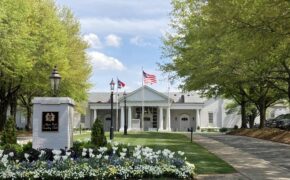Higher taxes on dining out to pay for Panthers stadium?
This article appeared in the August 19, 2019, edition of the Charlotte Ledger, an e-newsletter on local business news. Sign up for free here.
Erik Spanberg of the Charlotte Business Journal unleashed a smart piece over the weekend (paywall) delving into how state and local government might help pay for a new Panthers stadium. It has actual numbers and actual projections, the result of conversations with actual sources who know what they are talking about.
The upshot of Spanberg’s article is that people knowledgable about local government revenue seem to believe that hiking taxes on dining out could be a sensible way to help pay for the public share of a new stadium. Panthers owner David Tepper last month mentioned a “hotel revenue increase” as a potential funding source. But Spanberg writes:
The likelier source for local government stadium funding is a tax on drinks and food at bars and restaurants. Known as the prepared food tax, it already adds 1% to your tab. During fiscal year 2019, the 1% food and beverage tax generated $36.6 million, up from $34.7 million in 2018. The fiscal year ended June 30.
Doubling the current tax to 2% would, based on recent trends, reap somewhere in the neighborhood of $40 million per year. Assuming a borrowing leverage of 15-to-1 — a reasonable proposition — the food-and-beverage tax hike could then generate $600 million for an NFL stadium here.
That probably wouldn’t fully fund the public contribution to a $2B stadium, but it might get close. Developing city-owned land near the stadium could be another source. Property taxes and sales taxes seem to be off the table, Spanberg writes.
Watch for more of this linguistic slight-of-hand: Spanberg’s article repeatedly refers to the basket of hotel taxes, car-rental taxes and prepared-food taxes as “hospitality” or “tourism” taxes — which reflects the way some local officials talk about them. It’s easier to raise taxes paid mainly by out-of-towners. But taxes on dining out fall pretty squarely on local residents. Grabbing a sandwich at lunchtime on the way back to the office isn’t “tourism.”
The article quotes the CEO of the North Carolina Restaurant and Lodging Association opposing new taxes on dining-out:
“It’s baffling to me that when you collect $120 million a year (there is discussion about raising taxes),” said Lynn Minges, CEO of the trade group, referring to the current combined annual amount generated through local tourism taxes. … “We would oppose any effort to increase the meals tax or occupancy tax until there is better prioritization of how existing sources of revenue (are spent).”

